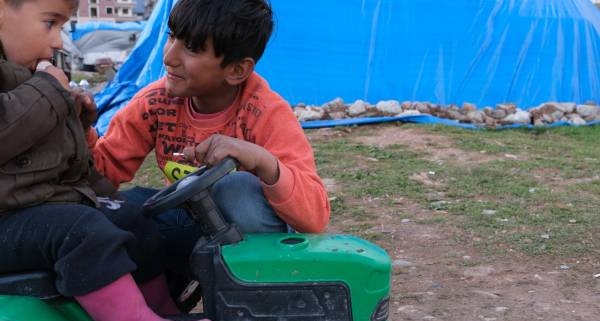Lessons from the humanitarian response to the 2023 earthquake in Türkiye and Syria from the International Blue Crescent: ‘Achieving Resilient and Inclusive Recovery’
By Hannah Terry
On February 6, 2023, a series of earthquakes hit southeastern Türkiye near the border with Syria. The initial earthquake was followed by hundreds of aftershocks, both causing significant destruction to the region: flattened essential infrastructure, claiming ever 50,000 lives, and injuring 100,000 more (Red Cross International). Over 1.5 million people were left homeless, and UNDP estimates that there are over 210 million metric tons of rubble on the Türkiye side alone.
When the news of the catastrophe reached The International Blue Crescent (IBC), a member of The Hague Humanity Hub, the airport landing strips were destroyed, and cell phone service was severely hampered. Yet despite these challenges IBC played (and still plays) a crucial role in the humanitarian response to the crisis. Their efforts have provided valuable lessons in providing effective assistance and support to the affected communities.
The Importance of Local Relationships
IBC attributes much of its success in its humanitarian response to strong relationships with national and local public authorities, as well as other international and non-governmental organizations. “These relationships proved crucial in establishing a rapid and responsive relief effort that respected the local culture, customs, and dynamics”, says IBC senior advisor Dr. Hande Barlin.
Having worked in the region since 2011, particularly in refugee response, Dr. Barlin says that IBC had already built trusting relationships with national and local authorities, INGOs, and NGOs. This prior experience enabled them to collaborate effectively with local stakeholders, gaining a deeper understanding of the communities’ needs and ensuring that their interventions were contextually appropriate and effective. It’s helpful that “IBC’s previous performance and strong image as well as proved track of outputs facilitated building trust with other vulnerable groups in the region” says Dr. Barlin.
How can organisations prioritise sustainable recovery?
Within humanitarian response efforts, IBC tries to balance the fastest response possible with both green and sustainable reconstruction. IBC prioritises green and sustainable reconstruction within the physical rebuilding of spaces and within the programmes that are developed. As a part of its rural development programme, the IBC has plans to built eco-friendly houses and agricultural infrastructure and to work with local farmers to increase the resilience of agricultural and livestock rearing practices in response to climate change.
To foster sustainable recovery, IBC is about to initiate a comprehensive livelihood programme targeting vulnerable communities. This programme encompasses various components, including vocational training, cash for work projects, job matching, and microenterprise support. By equipping individuals with valuable skills and providing economic opportunities, IBC will enable communities to rebuild their lives and regain a sense of self-sufficiency. These programmes will not only address immediate needs but also contribute to long-term resilience.
These interventions seek to increase the resilience of the regions and their communities, both towards disasters and climate change.
Inclusive humanitarian efforts
Both before and during its work responding to the 2023 earthquakes, IBC recognises the importance of considering the specific needs and vulnerabilities of different social groups, including Roma communities, refugees, immigrants, and other marginalised populations.
Dr. Barlin outlines that one of the ways they do this is by consistently conducting gender and vulnerability analyses to identify the unique challenges faced by these groups. Based on these analyses, IBC develops a vulnerability response strategy that ensures the protection and safety of vulnerable individuals. Following the earthquake, this strategy included measures such as providing privacy solutions for women, creating accessible facilities, and constructing child-friendly spaces.
IBC is intentionally constructing community centres in locations where the most disadvantaged and vulnerable groups are located to create a stronger support network. These community centres offer fully fledged psycho-social support, health, and empowerment interventions and will continue to provide food and non-food items. Children are also targeted through programming, in this regard, Dr. Barlin says that “children from vulnerable groups will be introduced to sciences through children university project to be taught by top university scientists in Turkey.”
Additionally, IBC encourages the active participation of vulnerable groups in decision-making processes, empowering them to have a voice in shaping the projects that directly affect them. Practices for empowering women and gender mainstreaming programmes are integrated into many aspects of the intervention. Active participation and a community-based approach are also integral parts of IBC’s programme.
Preparing for humanitarian catastrophes
Dr. Barlin encourages NGOs to build their capacity so that they can respond rapidly and mobilize promptly to catastrophic emergencies. When building plans, IBC believes that staying up to date on the latest data, technology, and reports is key, and preparing for the worst is best practice. IBC also emphasises the need for continuously evaluating, monitoring, and collecting reviews to identify areas for improvement.
The 2023 Kahramanmaras earthquake in Türkiye and Syria served as a powerful catalyst for learning and improving humanitarian response strategies. These lessons can guide future efforts to provide effective and sustainable assistance to communities affected by natural disasters. By prioritising the well-being and empowerment of the affected individuals, we can pave the way for a more resilient and inclusive recovery.
Our thanks to Dr.Hande Barlin and the International Blue Crescent team for their contributions to this piece. If you’d like to learn more about International Blue Crescent’s efforts following the Kahramanmaras earthquake, check out the situation report.
Photo by IBC International Blue Crescent.



